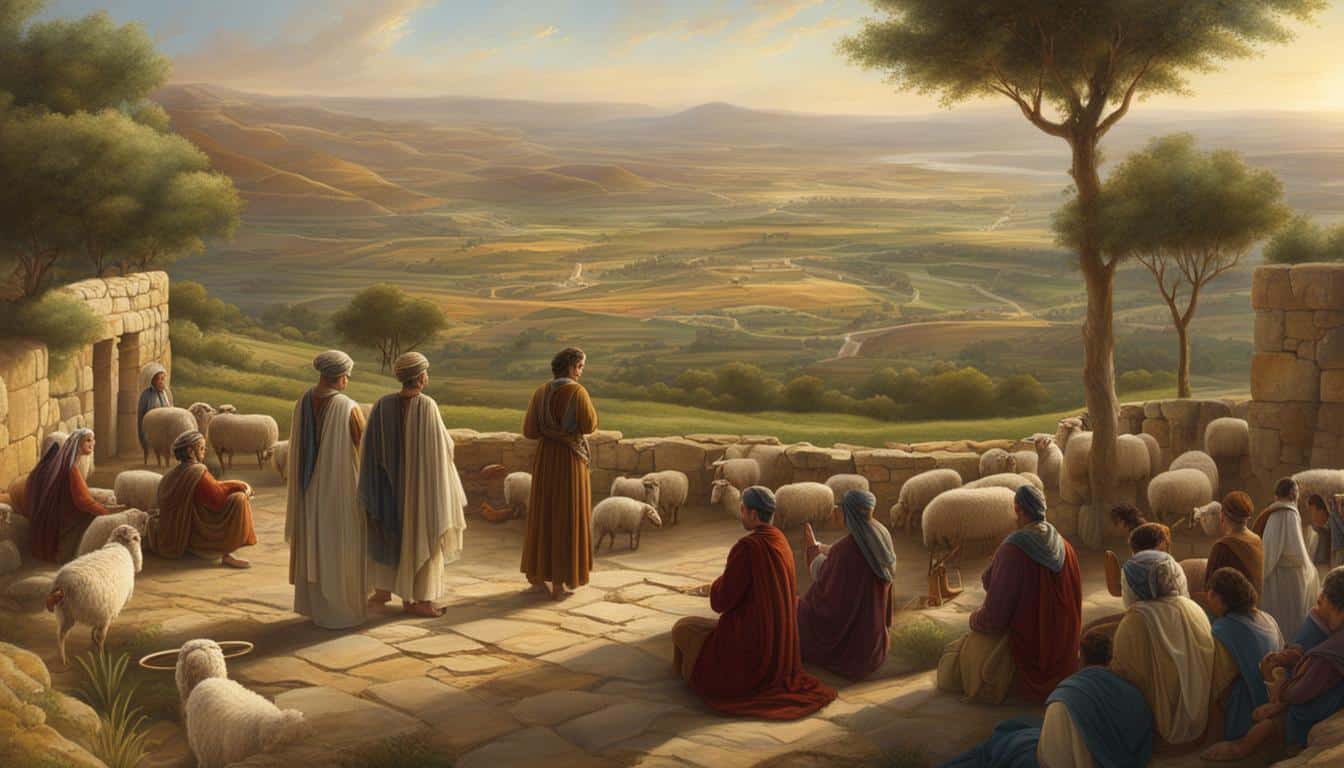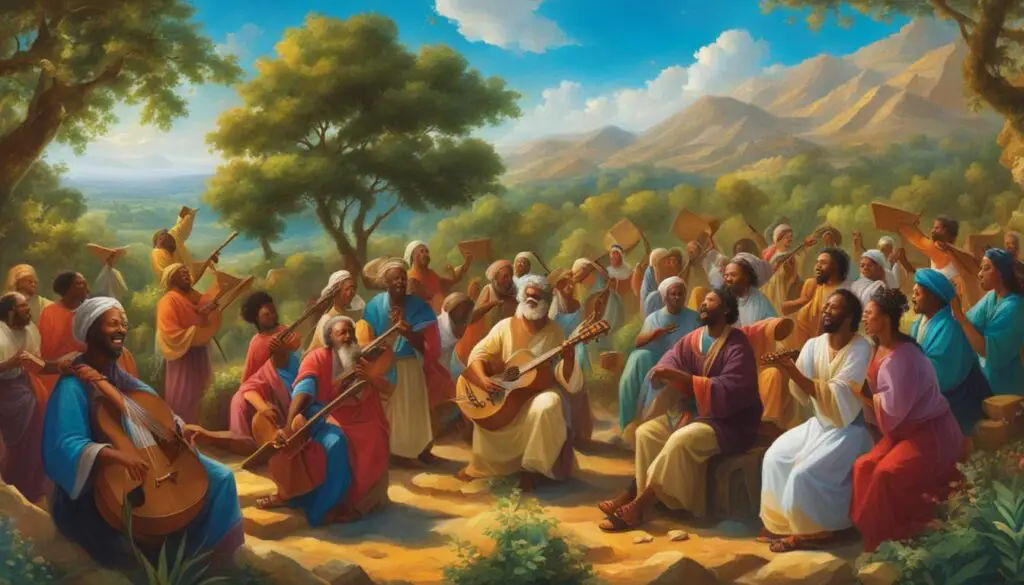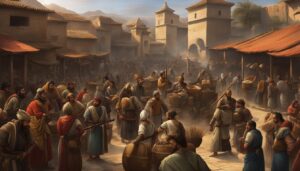
Welcome to this in-depth exploration of the historical context of the Psalms. In this section, we will delve into the biblical origins, cultural background, and religious significance of these ancient hymns. Join me as we uncover the rich tapestry of ancient Israel, the role of King David, and the theological themes woven throughout the Psalms.
Key Takeaways:
- The Psalms are the longest book in the Bible, consisting of 150 chapters or “psalms”.
- Various authors, including King David, contributed to the compilation of the Psalms.
- The Psalms offer insights into the worship practices and cultural background of ancient Israel.
- They provide a means for believers to connect with God on a personal and emotional level.
- The Psalms continue to inspire and challenge readers today, offering comfort, encouragement, and a deeper connection with the Divine.
Types of Psalms in the Book of Psalms
The Book of Psalms, with its 150 chapters, contains a rich variety of psalms that encompass different themes and emotions. Understanding the various types of psalms can provide deeper insight into the profound messages and expressions found within this beloved biblical book.
Hymns
One of the primary types of psalms found in the Book of Psalms is the hymn. These psalms focus on praising God’s name, His attributes, and His works. They celebrate His power, holiness, and faithfulness, and are often used in communal worship settings to express adoration and thanksgiving to the Almighty.
Lament Psalms
The Book of Psalms also contains lament psalms, which reflect the honest and raw emotions of sadness, grief, and complaint. These psalms provide a safe space for individuals to pour out their hearts to God, expressing their doubts, fears, and anguish. Lament psalms acknowledge the reality of pain and suffering, ultimately seeking comfort and deliverance from the Lord.
Royal Psalms
Another category of psalms in the Book of Psalms is the royal psalms. These psalms center around the kingship of God and His chosen representative on earth. They highlight the authority, power, and triumphs of the king, while also emphasizing the divine guidance and protection bestowed upon the leader. Royal psalms serve as reminders of God’s sovereignty and His role in the establishment and preservation of His chosen people.
Thanksgiving Psalms
The Book of Psalms contains thanksgiving psalms that express gratitude and praise to God for His blessings, deliverance, and faithfulness. These psalms often recount specific instances of God’s intervention and grace, serving as reminders of His goodness and loving-kindness. Thanksgiving psalms inspire believers to acknowledge God’s faithfulness in their lives and to give Him the honor and glory He deserves.
Wisdom Psalms
Wisdom psalms found within the Book of Psalms offer insights into righteous living and the pursuit of godly wisdom. These psalms provide guidance and instruction on how to live a life that is pleasing to God, expressing the value of wisdom, righteousness, and the fear of the Lord. Wisdom psalms encourage believers to seek divine understanding and to walk in the ways of God.
Mixed Types
Lastly, the Book of Psalms includes psalms with mixed types, combining elements from various categories. These psalms may include expressions of praise, lament, thanksgiving, and wisdom within the same composition. Their diverse content mirrors the complexity of human experiences and emotions, offering a holistic representation of the believers’ relationship with God.
| Type of Psalm | Theme |
|---|---|
| Hymns | Praising God’s name and works |
| Lament Psalms | Expressing sadness and complaints to God |
| Royal Psalms | Focusing on the king and his victories |
| Thanksgiving Psalms | Offering gratitude to God |
| Wisdom Psalms | Providing insights into righteous living |
| Mixed Types | Combining elements from various categories |
The Significance of the Psalms in Ancient Israel
In ancient Israel, the Psalms held immense significance in religious worship. They served as hymns that were sung during worship services and were composed as prayers and songs. The Psalms not only provided a means for believers to express their joys, sorrows, praises, and laments, but also allowed individuals to connect with God on a deeply personal level.
What makes the Psalms especially remarkable is their poetic beauty and emotional depth. The words and expressions found within the Psalms resonate with readers and listeners, evoking a wide range of emotions and creating a profound connection with the Divine. Whether one is experiencing moments of joy, anguish, or longing, the Psalms provide a spiritual language for expressing these experiences and connecting with God in a meaningful way.
“The Psalms are filled with poetic beauty and emotional depth, allowing individuals to connect with God on a personal level.”
Moreover, the Psalms not only reflect the individual experiences of believers but also serve as a communal expression of worship for the ancient Israelites. Through the Psalms, the collective voice of the community finds its place, expressing gratitude, seeking guidance, and praising God together. The Psalms unite the people of Israel in their devotion and strengthen their sense of belonging in the community of believers.
Importance of the Psalms Today
The significance of the Psalms extends far beyond ancient Israel. Even today, these sacred hymns continue to inspire and challenge readers from various religious backgrounds. The timeless themes and messages found within the Psalms allow individuals to find solace, encouragement, and spiritual guidance in their own lives.
The Psalms offer a unique blend of poetic beauty, emotional depth, and profound spiritual insights. They act as a source of comfort in times of distress, a reminder of God’s faithfulness, and a guide for righteous living. Through the Psalms, one can experience a deeper connection with the Divine and gain a greater understanding of the human experience in relation to the divine presence.

| Psalms | Religious Worship | Poetic Beauty | Emotional Depth | Connection with God |
|---|---|---|---|---|
| Hymns | Used as hymns in worship services | Reflects the beauty of language and expressions | Elicits a range of emotions | Provides a means to connect with God |
| Lament Psalms | Expresses sadness, complaints, and struggles | Artistic expression of pain and anguish | Allows for catharsis and seeking solace in God | Brings comfort and hope in times of sorrow |
| Royal Psalms | Focused on the king and his victories | Celebrates the monarchy and divine favor | Instills a sense of national identity and pride | Reinforces the relationship between God and the king |
| Thanksgiving Psalms | Expressions of gratitude and thankfulness | Offers praise and thanksgiving to God | Ignites a sense of joy and appreciation | Deepens the bond with God through gratitude |
| Wisdom Psalms | Insights into righteous living | Shares wisdom and moral guidance | Provides practical advice for ethical living | Promotes a deeper understanding of God’s ways |
| Mixed Types | Blend of various elements and themes | Combines different poetic styles and expressions | Explores a wide range of human experiences | Adaptable for personal reflection and interpretation |
Conclusion
The historical context of the Psalms provides invaluable insights into their biblical origins, cultural background, and religious significance in ancient Israel. These sacred hymns, attributed to various authors including King David, offer a glimpse into the worship practices and theological themes prevalent in that era.
By exploring the historical context of the Psalms, we gain a deeper appreciation for their rich cultural heritage. The Psalms serve as a testament to the ancient Israelites’ spiritual devotion and their profound connection with God. They are a reflection of the heartfelt prayers, praises, laments, and joys experienced by individuals in their relationship with the Divine.
Not only do the Psalms hold historical value, but they also resonate with readers across time and cultures. Their poetic beauty and emotional depth continue to touch the hearts of believers and non-believers alike. The Psalms offer solace, inspiration, and a timeless relevance that transcends religious boundaries.
Whether studied for their historical significance or cherished for their spiritual nourishment, the Psalms remain a treasure trove of wisdom. They invite us to explore the historical context of ancient Israel, to delve into the thoughts and emotions of those who came before us, and to appreciate the enduring power of these sacred hymns.
FAQ
What is the Book of Psalms?
The Book of Psalms is the longest book in the Bible, consisting of 150 chapters or “psalms.” It is divided into five smaller books with no specific reason for this division. The Psalms were compiled into their existing order by Ezra and other Jewish religious leaders in the 4th century BC.
Who are the attributed authors of the Psalms?
The Psalms are attributed to various authors, including King David, Asaph, and the sons of Korah.
What types of psalms are found in the Book of Psalms?
The Book of Psalms contains various types of psalms, including hymns, lament psalms, royal psalms, thanksgiving psalms, wisdom psalms, and mixed types.
What role did the Psalms play in ancient Israel?
The Psalms played a significant role in the religious worship of ancient Israel, being used as hymns in worship services and composed as songs and prayers. They provided a means for believers to express their joys, sorrows, praises, and laments and connect with God on a personal level.
What is the historical context of the Psalms?
The Psalms have their origins in ancient Israel, with various authors contributing to the collection. They offer a rich cultural background and religious significance, providing insights into worship practices, theological themes, and the relationship between God and His people.








